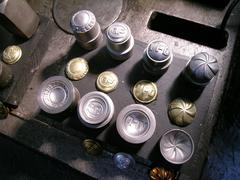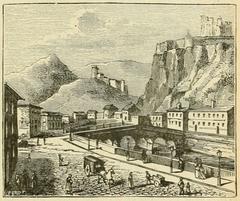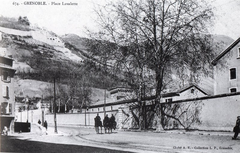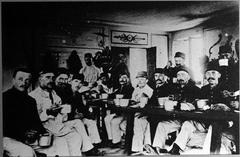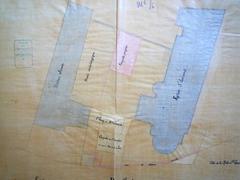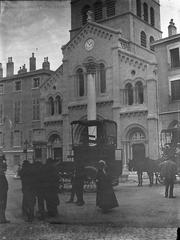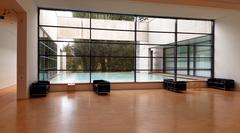Institut Néel Grenoble: Visiting Hours, Tickets, and Guide to Historical Sites
Date: 04/07/2025
Introduction
Located in the heart of Grenoble’s Polygone Scientifique district, Institut Néel is a world-renowned research center specializing in condensed matter physics, nanoscience, and quantum materials. Established in 2007 through the merger of four historic laboratories, the institute honors Nobel laureate Louis Néel, whose pioneering work revolutionized the field of magnetism. Functioning as an independent research unit under the French National Centre for Scientific Research (CNRS), Institut Néel is recognized globally for advancements in magnetism, spintronics, and quantum phenomena that continue to shape modern science and technology.
Although Institut Néel primarily serves as a cutting-edge research facility, it also fosters public engagement through selective open days, guided tours, and special events—often aligned with European science outreach initiatives. Its strategic location allows visitors to easily combine a visit to the institute with exploration of Grenoble’s rich cultural and historical heritage, including landmarks like the Musée de Grenoble and the Bastille fortress. This comprehensive guide provides essential information on Institut Néel’s history, visiting hours, accessibility, special events, and surrounding attractions to help plan an insightful and memorable visit. For the most current details, consult the Institut Néel official website.
Contents
- Origins and Evolution of Institut Néel
- Louis Néel: Life, Career, and Scientific Achievements
- Visiting Institut Néel: Practical Information
- Visiting Hours and Tickets
- Access and Accessibility
- Nearby Attractions and Travel Tips
- Special Events and Guided Tours
- Visitor Facilities
- Frequently Asked Questions (FAQ)
- Visuals and Media Recommendations
- Explore More: Related Grenoble Historical Sites
- Plan Your Visit and Stay Connected
Origins and Evolution of Institut Néel
Institut Néel was founded in 2007 through the merger of four distinguished laboratories: the Centre de Recherches sur les très basses températures (CRTBT), Laboratoire d’étude des propriétés électroniques des solides (LEPES), Laboratoire Louis Néel (LLN), and Laboratoire de cristallographie (LdC). Named in honor of Nobel laureate Louis Néel, the institute continues a tradition of scientific excellence that has defined Grenoble’s status as a leading center for physics and nanoscience (Wikipedia, Institut Néel official site).
Louis Néel: Life, Career, and Scientific Achievements
Early Life and Education
Louis Néel was born in 1904 in Lyon, France. After excelling at the Lycée du Parc and graduating from the École Normale Supérieure in Paris in 1928, he completed his Doctor of Science at the University of Strasbourg under Pierre-Ernest Weiss (Nobel Prize biography, Assignment Point).
Academic and Research Career in Grenoble
In 1945, Néel established the Laboratoire d’Electrostatique et de Physique du Métal in Grenoble, which quickly became a prominent CNRS laboratory. He later served as director of the Institut Polytechnique de Grenoble and founded the Centre d’Etudes Nucléaires de Grenoble (Nobel Prize biography, Assignment Point).
Scientific Contributions and Honors
Louis Néel introduced the concepts of antiferromagnetism and the Néel temperature, which fundamentally advanced the understanding of magnetic materials and enabled innovations in spintronics and data storage (Assignment Point). During World War II, his expertise was critical in developing anti-magnetic mine technologies. In 1970, he received the Nobel Prize in Physics and was celebrated with numerous honors internationally (Nobel Prize biography).
Visiting Institut Néel: Practical Information
Visiting Hours and Tickets
Institut Néel is primarily a research facility and does not maintain regular public visiting hours or ticketed access. However, the institute participates in special outreach events—such as the European Researchers’ Night and the national Science Festival—during which guided tours and public activities are available. Check the official website for event dates, registration requirements, and visitor protocols.
Access and Accessibility
- Location: 25 avenue des Martyrs, Polygone Scientifique, Grenoble, France
- By Tram: Tram lines A and B serve “Polygone Scientifique,” “Cité Internationale,” and “Presqu’île Scientifique” stops.
- By Bus: Multiple lines, including C6, 22, 54, C11, C12, and T64.
- By Train: Grenoble station is connected by TGV to Lyon, Paris, and Marseille.
- From Airports: Grenoble-Saint Geoirs and Lyon-Saint Exupéry (approx. 1 hour); Geneva Airport (approx. 2 hours).
The institute is wheelchair accessible; visitors with special needs should contact the administration in advance to ensure appropriate assistance.
Special Events and Guided Tours
Institut Néel hosts several public events each year, notably during:
- European Researchers’ Night
- Fête de la Science (National Science Festival)
During these events, visitors can enjoy guided tours, demonstrations, and interactive exhibitions. Educational groups may request special arrangements for guided visits; advanced booking is necessary.
Visitor Facilities
Institut Néel does not have a dedicated visitor center or on-site café, but amenities are available nearby within the Polygone Scientifique area and Grenoble city center. For events, temporary reception areas and information points are typically provided.
What to See and Experience
While regular lab access is restricted, visitors during public events can experience:
- Nanoscience Facilities: Learn about the institute’s vibration-minimized Nanosciences building, essential for quantum research.
- Seminars and Talks: Attend public lectures and seminars featuring international experts.
- Special Exhibitions: Explore collaborations with local museums and science centers.
Nearby Attractions and Travel Tips
After your visit to Institut Néel, consider these attractions:
- Musée de Grenoble: Renowned for its art collections (Musée de Grenoble)
- Bastille Fortress: Historical site accessible by cable car, offering panoramic city and alpine views (Grenoble Bastille)
- European Synchrotron Radiation Facility (ESRF): A major scientific facility nearby, occasionally open for tours
- Historic Old Town: Explore Grenoble’s charming streets, markets, and local cafés
Travel Tips:
- Use Grenoble’s efficient tram and bus system for convenient, eco-friendly access.
- Book public event visits in advance.
- Combine your institute visit with exploration of other scientific and cultural landmarks.
Frequently Asked Questions (FAQ)
Q: Can I visit Institut Néel any day?
A: No, regular public visits are not available; access is limited to announced events or by prior arrangement.
Q: Are there entrance fees?
A: There are no standard ticket fees; public events are generally free but may require registration.
Q: Are guided tours available in English?
A: Yes, some tours and public events are conducted in English; check availability in advance.
Q: Is Institut Néel suitable for children and school groups?
A: Yes, particularly during outreach events and educational programs.
Q: Is the institute accessible for people with reduced mobility?
A: Yes, but notify event organizers in advance for specific needs.
Q: Is photography permitted?
A: Photography is allowed in common areas and during events; restrictions may apply inside laboratories.
Visuals and Media Recommendations
Visual resources, including images of the institute’s modern architecture and event galleries, are available on the official Institut Néel website. Interactive maps of the Polygone Scientifique and Grenoble city center are recommended for navigation.
Explore More: Related Grenoble Historical Sites
For broader city attractions, consult the Grenoble Tourist Office.
Plan Your Visit and Stay Connected
- Check the Institut Néel official website and events calendar for the latest announcements.
- Follow Institut Néel on social media for real-time updates.
- Download the Audiala app for guided tours and audio content on Grenoble’s scientific and cultural heritage.
Summary and Visitor Recommendations
Institut Néel exemplifies the intersection of scientific innovation and cultural heritage in Grenoble. While daily public access is limited, the institute’s outreach events offer rare opportunities to explore groundbreaking research. Its proximity to Grenoble’s museums and historic sites makes it an ideal component of any cultural itinerary. To maximize your visit, watch for public events, register in advance, and use public transportation for easy access. Engaging with Institut Néel not only enriches your understanding of contemporary physics but also connects you with the enduring legacy of Louis Néel and the dynamic spirit of Grenoble.
For further information and updates, visit the Institut Néel website.
Sources and Official Links
- Institut Néel - Wikipedia
- Institut Néel Official Website (French)
- Louis Néel - Nobel Prize Biography
- Biography of Louis Néel (Assignment Point)
- Institut Néel Official Website (English)
- Institut Néel Events Calendar
